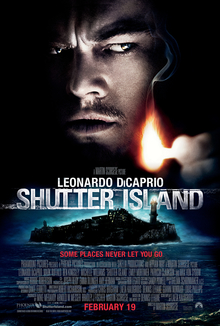 It's an intriguing thought, that millions of cinema-goers are currently getting their first taste of the music of composers such as Schnittke, Cage, Scelsi, and Feldman. This is thanks to the soundtrack of Martin Scorsese's latest, Shutter Island, which features a variety of modern classical pieces rather than a specially composed score. The movie's a conscious effort to pay homage to forties B-movies, which of course means it's smarter, better put together, more emotionally engaging, and possessing of a deeper insight into the human condition than most big movies. OK, I admit I'm not neutral when it comes to Scorsese. With Shutter Island, we've got a film that a lot of directors could have pulled off pretty easily, but Scorsese brings that much more to the table, and manages to make it something other than just a couple of hours' cheap thrills. The music is certainly a major part of his success; hats off to Robbie Robertson, who chose the music and in a press release said "This may be the most outrageous and beautiful soundtrack I’ve ever heard". Not being a soundtrack afficonado, I can't instantly agree with him. But I think he's right. Saw the film Saturday evening, bought the soundtrack Sunday morning.
It's an intriguing thought, that millions of cinema-goers are currently getting their first taste of the music of composers such as Schnittke, Cage, Scelsi, and Feldman. This is thanks to the soundtrack of Martin Scorsese's latest, Shutter Island, which features a variety of modern classical pieces rather than a specially composed score. The movie's a conscious effort to pay homage to forties B-movies, which of course means it's smarter, better put together, more emotionally engaging, and possessing of a deeper insight into the human condition than most big movies. OK, I admit I'm not neutral when it comes to Scorsese. With Shutter Island, we've got a film that a lot of directors could have pulled off pretty easily, but Scorsese brings that much more to the table, and manages to make it something other than just a couple of hours' cheap thrills. The music is certainly a major part of his success; hats off to Robbie Robertson, who chose the music and in a press release said "This may be the most outrageous and beautiful soundtrack I’ve ever heard". Not being a soundtrack afficonado, I can't instantly agree with him. But I think he's right. Saw the film Saturday evening, bought the soundtrack Sunday morning.The first stroke of genius is the choice of Penderecki's Symphony no.3 - the repeated low notes that begin the 4th movement set the ominous tone as the two federal marshalls approach the island. Very Bernard Herrmann, really. This music returns repeatedly throughout the film - you might call it the main theme, or one of them at any rate. Much of the subsequent action is underscored by music that's variously sinister (Cage's Music for Marcel Duchamp), spooky (Feldman's Rothko Chapel), and disturbing (Scelsi's Uaxuctum: The Legend of the Mayan City Which They Themselves Destroyed for Religious Reasons). The second stroke of genius is what's playing on Max von Sydow's turntable. "What is that? Brahms?" asks Mark Ruffalo. "No. It's... Mahler", Leo diCaprio replies, heralding a flashback to... well. Yes indeed it is Mahler, specifically the piano quartet movement he wrote as a teenager. OK, slight mistake on the part of the film makers here - the work had its first known performance several years after the events of the film - but the music is so good that you forgive this (in fact, I'd only heard the piece for the first time about a month ago, so I too had a "What is that?" reaction).
The third stroke of genius is one that most of the audience on Saturday chose to completely avoid, because they left the cinema as soon as they possibly could when the credits began to roll. I don't understand this sort of behaviour. I see it all the time, regardless of the film. OK, maybe a few of them had a bus to catch, but can they not have even a moment's pause before charging off? Maybe the film meant nothing to them - literally meant nothing, because it takes more than a second to digest the film's final line. Anyway, the credits rolled, Mahler played again, and then what these fools missed was an extraordinary "remixed" version of Dinah Washington singing "This Bitter Earth", her vocals (slowed down from the original?) laid over a haunting string work by Max Richter called "On the Nature of Daylight". I'm inclined to believe that the people who left the cinema quickly didn't actually attend the whole film.
No comments:
Post a Comment